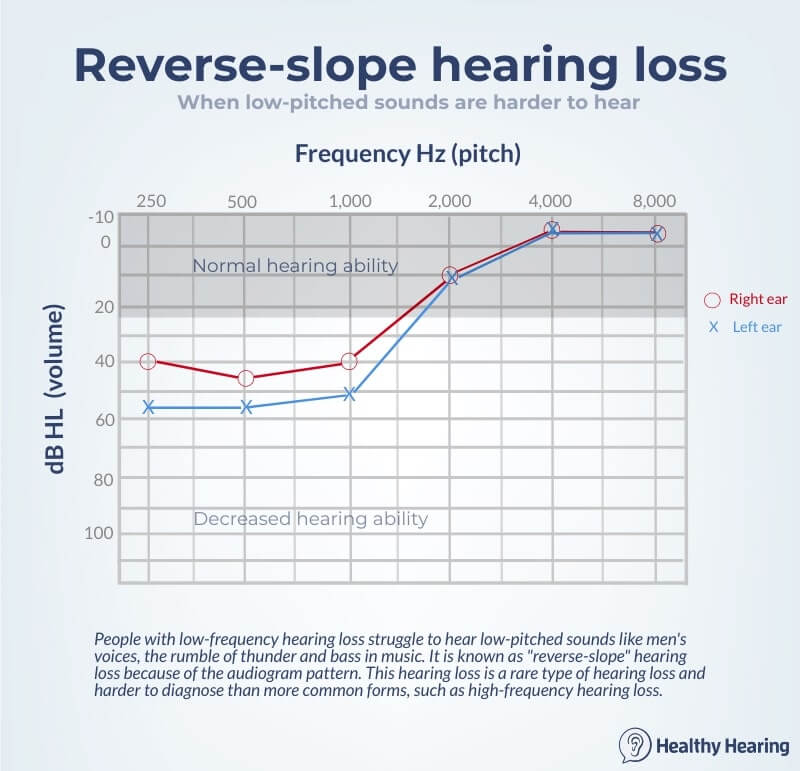|
www.HealthyHearing.com |
What is reverse-slope (low frequency) hearing loss?This rare form of hearing loss is trickier to diagnose
Contributed by Joy Victory, managing editor, Healthy Hearing One of the more rare forms of hearing loss is known as low-frequency hearing loss, often referred to as "reverse-slope" hearing loss. This name is because of how it appears on an audiogram, a standardized chart audiologists and hearing instrument specialists use to measure hearing levels during testing.
How it affects what you hearLow-frequency hearing loss is defined as a reduced ability to hear low-pitched sounds, such as men's voices, bass sounds in music and thunder. How well you hear these sounds—or not—depends on the degree of your hearing loss, which can range from mild to profound. When it comes to speech, this type of hearing loss mostly affects how you perceive the volume of speech—as in, how loud it sounds. It also makes it harder to hear vowel sounds, which are spoken at a lower-pitch than consonant sounds. Unlike high-frequency hearing loss, it's helpful to have people speak louder, as it will improve your ability to hear lower sounds (assuming you don't wear hearing aids). Symptoms of low-frequency (reverse slope) hearing lossYou may find it easier to understand women and children versus men, especially if they talk loudly. You may struggle to hear on the phone when compared to in-person conversations. Also, car, truck and airplane engines probably don't make many "rumbling" sounds for you, and music may sound very tinny. You might also seem uncannily good at hearing very high-pitched sounds that other people don't notice or can't hear. You may prefer people stand very close when they speak to you. Your own spoken speech probably sounds fairly normal. Causes of reverse-slope hearing lossIn some cases, this type of hearing loss is genetic or acquired after a childhood illness or viral infection. But most cases are linked to autoimmune disorders, otosclerosis or Meniere's disease, which causes hearing loss, dizziness and tinnitus. However, in Meniere's, the hearing loss may evolve over time, progressing to other types of hearing loss that affect sound across the spectrum of pitches. While the link is not well-understood, low-frequency hearing loss is a known risk factor for cardiovascular disease. How is it diagnosed?Unfortunately, because this type of hearing loss is rare, it's sometimes misdiagnosed or undiagnosed for years, if not decades. Standard hearing tests are usually set up (or calibrated, in scientific terms) to detect other types of hearing loss. With correct and rigorous testing, though, an audiogram will show a "reverse-slope" that slopes from low to high, a pattern that indicates the loss of low-pitched sounds. This is opposed to the far more common high-frequency hearing loss, which slopes from high to low on an audiogram. Treatments for reverse-slope hearing lossHearing aids can help amplify lower sounds without over-amplifying higher-pitched sounds. However, because of the rarity and complexity of this type of hearing loss, it can take a little (or a lot) of trial and error to find the right amplification. One issue you might deal with, for example, is a hearing loss phenomenon known as recruitment. You'll want a patient and experienced audiologist to help you sort out the best treatment for you. If you have Meniere's, it's important to follow your doctor's recommendations to preserve what hearing you have. For an in-depth look at reverse slope hearing loss, we recommend reading: The Bizarre World of Extreme Reverse-Slope Hearing Loss (or Low Frequency) Hearing Loss. How to get helpIf you or a loved one suspect you have reverse-slope hearing loss, don't hesitate to visit a hearing aid center near you. If you have reverse-slope hearing loss and would like to share your experience to help others, please leave a comment below. Note: This article was medically reviewed in September 2023 by Dr. Patricia Weiser, a licensed pharmacist and medical writer. She obtained her Doctor of Pharmacy degree at the University of Pittsburgh. Joy Victory, managing editor, Healthy Hearing
|
Featured clinics near me
Earzlink Hearing Care - Reynoldsburg
7668 Slate Ridge Blvd
Reynoldsburg, OH 43068

Find a clinic
We have more hearing clinic reviews than any other site!



 Joy Victory has extensive experience editing consumer health information. Her training in particular has focused on how to best communicate evidence-based medical guidelines and clinical trial results to the public. She strives to make health content accurate, accessible and engaging to the public.
Joy Victory has extensive experience editing consumer health information. Her training in particular has focused on how to best communicate evidence-based medical guidelines and clinical trial results to the public. She strives to make health content accurate, accessible and engaging to the public.